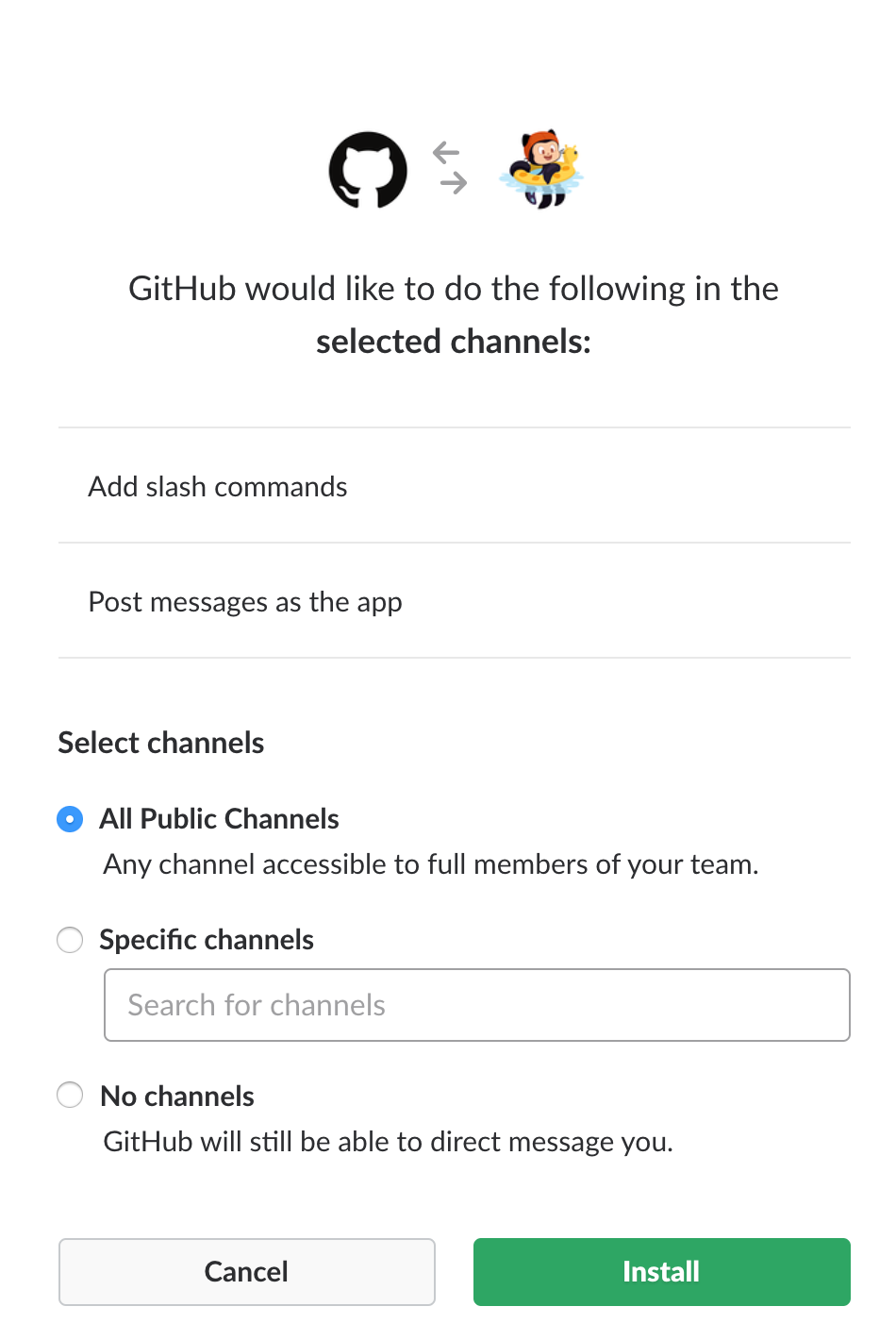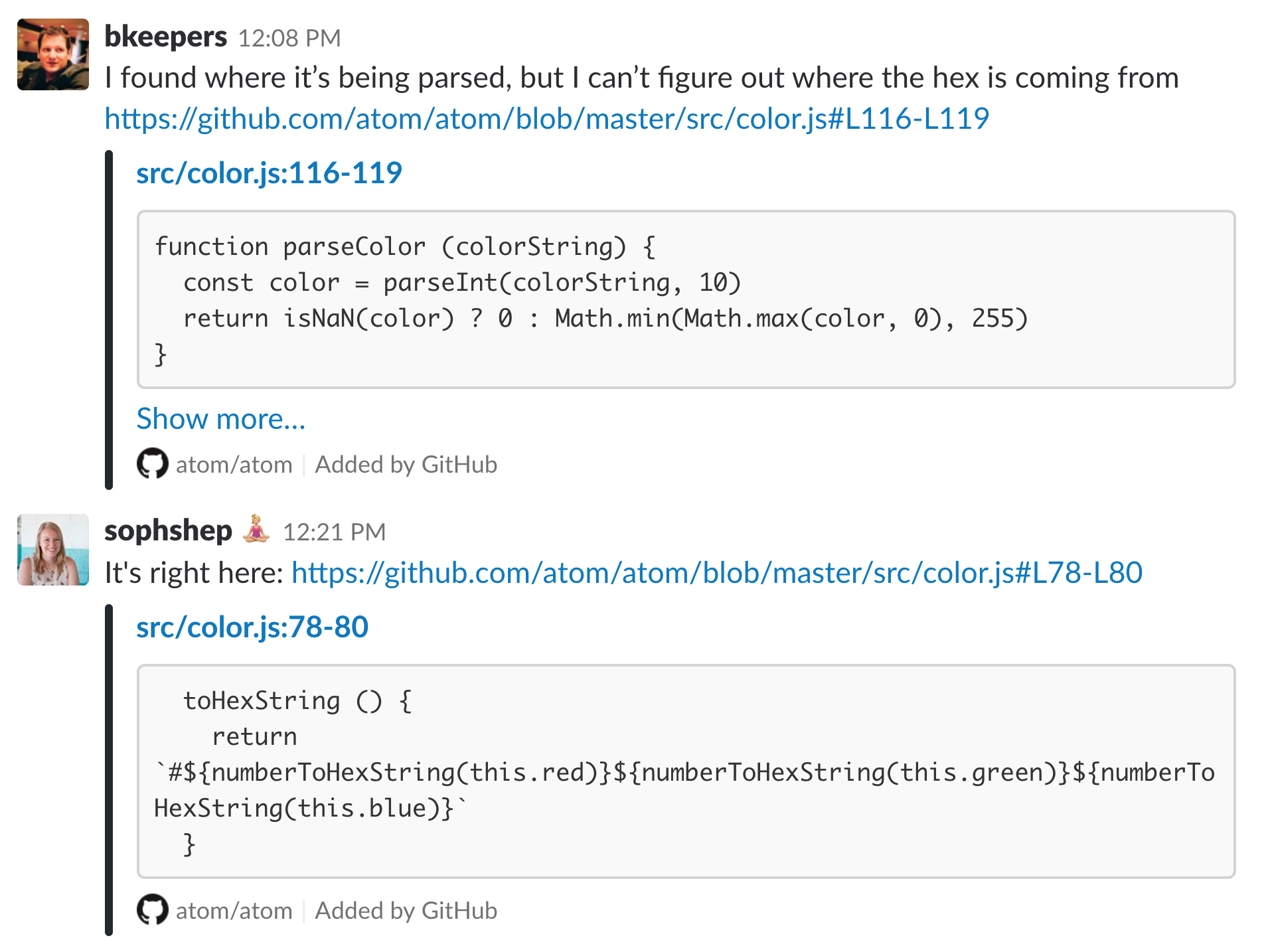| Build | Code Coverage | Dependencies |
|---|---|---|
Heads Up! The GitHub and Slack app has a few new features to help you turn conversations into next steps. Take action on pull requests, issues, and more right from your Slack channels to start moving work forward, faster. Read more about it on the GitHub blog.
The GitHub integration for Slack gives you and your teams full visibility into your GitHub projects right in Slack channels, where you can generate ideas, triage issues and collaborate with other teams to move projects forward. This integration is an open source project, built and maintained by GitHub.
- Installing the GitHub integration for Slack
- Getting Started
- Need help?
- Contributing
- License
This app officially supports GitHub.com (which includes our GitHub Enterprise cloud-hosted offering) and Slack.com, but the team plans to support GitHub Enterprise Server (our self-hosted product) and Slack Enterprise Grid in the future.
Install the GitHub integration for Slack. After you've signed in to your Slack workspace, you will be prompted to give the app access:
After the app is installed, and once you've added the GitHub integration to the relevant channels using /invite @github, you will see previews of links to GitHub issues, pull-requests, and code rendered as rich text in your workspace.
At this point, your Slack and GitHub user accounts are not linked. To link the two accounts, authenticate to GitHub using a /github slash command, /github signin.
The /github slash command also accepts a subscribe argument that you can use to subscribe to an Organization or Repository's activity /github subscribe <organization>/<repository>.
If you originally gave the app access to "All repositories" and you've created a new private repository on GitHub after installing the GitHub integration for Slack, the /github subscribe command will work automatically on your new repository. If you installed the app on a subset of repositories, the app will prompt you to install it on the new repository.
The /github slash command also supports unsubscribe. To unsubscribe to notifications from a repository, use /github unsubscribe <organization>/<repository>
By granting the app access, you are providing the following authorizations to your GitHub and Slack accounts:
| Permission scope | Why we need it |
|---|---|
| Access private conversations between you and the App | To message you with instructions. |
| View links to GitHub.com in messages | To render rich links from github.com |
| Add link previews to GitHub.com to messages | To render rich links to github.com |
| Add slash commands | To add the /github slash command to your Slack workspace |
| View the workspace or organization's name, email domain, and icon | To store subscriptions you set up |
| Post messages as the app | To notify you of activity that happens on GitHub, in Slack |
| Permission scope | Why we need it |
|---|---|
| Read access to code | To render code snippets in Slack |
| Read access to commit statuses, checks, issues, metadata, pull requests, and repository projects | To render previews of links shared in Slack |
| Write access to issues, deployments, and pull requests | To take action from Slack with the /github command and directly from messages |
Subscribe to an Organization or a Repository
On repositories, the app notifies of open, close, and re-open events on pull requests and issues in repositories you've subscribed to. It also notifies of any push directly to the repository's default branch as well as comments on issues and pull requests.
When a user posts a GitHub link to issues and pull requests, directly linked comments, code blobs with line numbers, as well as organizations, repositories, and users in Slack, a preview of the link will be shown.
Previews of links will not be shown if:
- link previews for
github.comhave been disabled for your workspace - the same link was already shared in the last 30 minutes in the same channel
- 3 or more links are shared in the same chat message
- The repository is private and the user that shared the link:
- has not signed in to their GitHub account
- asked not to show a preview when prompted
- the GitHub app is not in the channel, which you can remedy with
/invite @github
Slack conversations often lead to decisions and actionable takeaways. Now it’s easier to start on next steps from Slack with slash commands for common GitHub actions, using /github [action] [resource]. These commands let you:
- Close an issue or pull request with
/github close [issue link] - Reopen an issue or pull request with
/github open [pull request link] - Open a new issue with
/github open [owner/repo]
You can also take action on GitHub directly from a Slack message by clicking on the '... More Actions' menu available on every Slack message. From there you can:
- Attach a message as a comment to an existing issue or pull request
- Select an issue by choosing from an automatically loaded list of recently active issues and pull requests that involve you or by entering a URL to an issue or pull request
You can customize your notifications by subscribing to activity that is relevant to your Slack channel, and unsubscribing from activity that is less helpful to your project.
Settings are configured with the /github slash command:
/github subscribe owner/repo [feature]
/github unsubscribe owner/repo [feature]
These are enabled by default, and can be disabled with the /github unsubscribe owner/repo [feature] command:
issues- Opened or closed issuespulls- New or merged pull requests, as well as draft pull requests marked "Ready for Review"statuses- Statuses on pull requestscommits- New commits on the default branch (usuallymaster)deployments- Updated status on deploymentspublic- A repository switching from private to publicreleases- Published releases
These are disabled by default, and can be enabled with the /github subscribe owner/repo [feature] command:
reviews- Pull request reviewscomments- New comments on issues and pull requestsbranches- Created or deleted branchescommits:all- All commits pushed to any branch+label:"your label"- Filter issues, pull-requests and comments based on their labels.
You can subscribe or unsubscribe from multiple settings at once. For example, to turn on activity for pull request reviews and comments:
/github subscribe owner/repo reviews comments
And to turn it back off:
/github unsubscribe owner/repo reviews comments
Label filters allow filtering incoming events based on a whitelist of required labels.
This is an overview of the event types that are affected by the required-label filter.
| Event | Is filtered |
|---|---|
| Pull | ✅ Yes |
| Comment (PR and Issue) | ✅ Yes |
| Issue | ✅ Yes |
| Review | ✅ Yes |
| Status/Checks | ✅ (Depends on PR) |
| Deployment | ❌ No |
| Commit/Push | ❌ No |
| Public | ❌ No |
| Branch | ❌ No |
Create a filter with:
/github subscribe owner/repo +label:priority:HIGH
This creates a required-label filter with the value priority:HIGH.
Incoming events that support filters discarded unless they have that label.
To update the exiting filter just enter a new one, the old one will be updated. Currently, we only support having one filter. Multiple filters might be supported in the future.
/github subscribe owner/repo +label:"teams/designers"
Now the exiting filter priority:HIGH has been replaced by teams/designers.
Removing a filter is available via unsubscribe
/github unsubscribe owner/repo +label:teams/designers
This removes the priority:HIGH filter.
To see the currently active filters use
/github subscribe list features
It is common to have certain special characters in labels. Therefore we added support for the most common special characters for label filters. Here a few examples:
label:priority:HIGHlabel:teams/designerslabel:"DO NOT MERGE"label:"very important"label:":construction: WIP"
Most labels will work seamlessly, this includes all emojis that slack and github provide out of the box. However in the following rare circumstances you might run into difficulties:
- Multibyte characters that are not encoded as
:foo: ,is reserved
When you install the new GitHub integration for Slack in your Slack workspace, you'll be prompted to move over all of your existing subscriptions - so getting set up again is easy. As you enable individual subscriptions in the new app, your settings will be automatically migrated and subscriptions in the legacy app will be disabled.
Please fill out GitHub's Support form and your request will be routed to the right team at GitHub.
Want to help improve the integration between GitHub and Slack? Check out the contributing docs to get involved.
The project is available as open source under the terms of the MIT License.
When using the GitHub logos, be sure to follow the GitHub logo guidelines.



